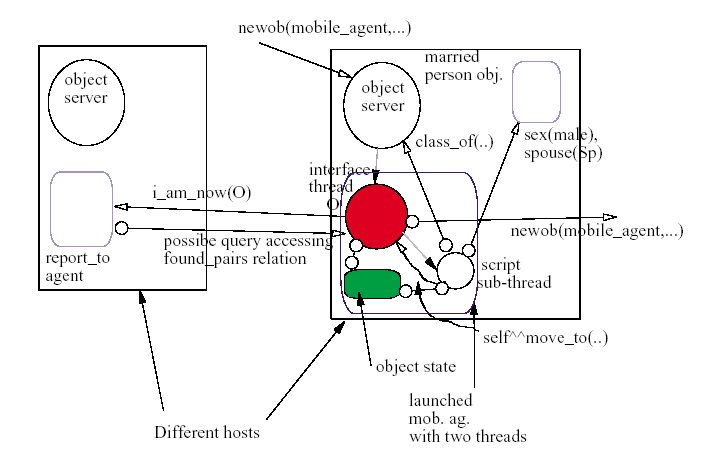| Jim Cunningham | |
| Other academic members: | |
| Keith Clark | |
| Stuart Cox | |
| Bob Kowalski | |
The Communicating Agents Group is interdepartmental, having academic staff, research staff and research students in both the Computing and Electrical Engineering Departments. Their interests include the Design of Artificial Intelligent Agents, Human Interaction with Agents, Agent Programming Languages, Languages and Protocols for Communication, and the construction and simulation of Robotic Agents.

Simple mobile agent. From "Agents as multi-threaded logical objects" by Clark and Robinson.
The group has a record of engagement in European Projects and in international intitiatives to foster the development and application of agent technology. The projects have contributed to the development of telecommunications middleware for agents, to agent electronic commerce platforms, the definition and validation of negotiation protocols, agent construction of virtual enterprises, the security of mobile agents and residential access to new internet applications. Members of the group have contributed to the standards and methodological work of the Foundation for Intelligent Physical Agents, the Agentlink network of excellence, and agent oriented work of the Object Management Group.
The April process-oriented agent implementation language originated in an Esprit project. It has been developed further in research to enhance agent design methods and applied in new internet applications, including talking head style interaction, agent learning, and distributed information gathering. An April Agent Platform is providing a London server for the EU Agentcities project. April communication technology is being incorporated in new Prolog style multi-threading programming languages, including GO!, a new high integrity logic programming language which is under development. Applications to robotics, including a real-time April are also being pursued.
In keeping with the intentional stance in agent reasoning systems, members of the group use a variety of dynamic, modal, temporal and meta-level logical systems. Novel inference methods for logical agents are being incorporated in both April and Prolog systems. Recent work on temporal reasoning provides a new logical explication of aspect in natural language and suggests refinements of the intentional stance which might be appropriate for a more complex, concurrent, and even conscious artificial mind.
The Communicating Agents Group is interdepartmental, having academic staff, research staff and research students in both the Computing and Electrical Engineering Departments. Their interests include the Design of Artificial Intelligent Agents, Human Interaction with Agents, Agent Programming Languages, Languages and Protocols for Communication, and the construction and simulation of Robotic Agents.
The group has a record of engagement in European Projects and in international initiatives to foster the development and application of agent technology. The projects have contributed to the development of telecommunications middleware for agents, to agent electronic commerce platforms, the definition and validation of negotiation protocols, agent construction of virtual enterprises, the security of mobile agents and residential access to new internet applications. Members of the group have contributed to the standards and methodological work of the Foundation for Intelligent Physical Agents, the Agentlink network of excellence, and agent oriented work of the Object Management Group.
The April process-oriented agent implementation language originated in an Esprit project. It has been developed further in research to enhance agent design methods and applied in new internet applications, including talking head style interaction, agent learning, and distributed information gathering. April communication technology is being incorporated in new Prolog style multi-threading programming languages. Applications to robotics, including a real-time April are also being pursued.
In keeping with the
intentional stance in agent reasoning systems, members of the group use a
variety of dynamic, modal, temporal and meta-level logical systems. Novel
inference methods for logical agents are being incorporated in both April and
Prolog systems. Recent work on temporal reasoning provides a new logical
explication of aspect in natural language and suggests refinements of the
intentional stance which might be appropriate for a more complex, concurrent,
and even conscious artificial mind.